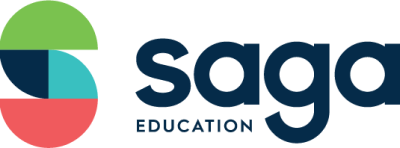Margaret Moffett | October 8, 2021

Middle and high school math tutors routinely have to solve complex problems that, at least in their minds, are much more daunting than systems of equations and triangle congruence: How much time should I spend reviewing the previous tutoring session? Which example problems are appropriate to use with which students? And what steps should I take to make my students’ experience more joyful?
Programs historically select algebra and geometry tutors for … well, their algebra and geometry skills, not their teaching pedigree. Math tutors may understand polynomials and angle relationships like nobody’s business, but not all of them have the pedagogical skills to assess whether their students are “getting it.”
For that very reason, Saga Education recently made available a wealth of materials that not only will boost student achievement in middle school and secondary math, but equip tutors with the tools they need to deliver high-impact tutoring.
This resource, Saga Curriculum, isn’t new; it’s the same curriculum Saga has used to prepare its fellows to work with middle and high school math students. It is, however, free this year, and available to anyone who wants it — from nationwide math tutoring programs to schools needing to train tutors working with 6th through 11 grade students.
“What makes Saga Curriculum unique is that it's geared towards supporting our tutors. It's not a whole-class lesson plan,” says Halley Bowman, Saga’s senior director of academics. “You don't need to have a background in education to understand how to support students using these materials. It offers strategies that aren't built into regular teacher materials — tips on how to implement different structures, misconceptions to look out for, the exact questions tutors can ask to check for student understanding.
Here’s how it works: Saga Curriculum provides lessons on a host of topics in middle and high school math: percentages and polygons. Triangles and transformations. Proportions and probabilities.
Saga Curriculum offers two versions of each lesson. The student versions contain what one might imagine — reviews, practice problems and reinforcement exercises at the end.
The version for tutors, however, is geared toward helping tutors solve challenges they might face while working one on one with students. Each lesson provides a refresher on the content, along with guides for asking students the right questions to gauge their comprehension of the subject matter.
Saga knows this is information that tutors crave. Each year, it convenes focus groups of tutoring fellows to discover the kind of support they say they need. In fact, Bowman says the idea to start with an overview of each lesson in the tutoring version came from a Saga fellow. Tutors are expected to cover a range of math topics, some of which they may not have reviewed in a while, “so we added a preface so tutors can access the lesson easier,” she says.
Saga is making the materials in Saga Curriculum available for free for one reason: performance in middle and high school math is tied to overall student achievement. According to research, students who pass Algebra I are four times more likely to graduate high school. A study from early 2021 found that ninth- and 10th-graders in Chicago who received regular algebra tutoring from Saga saw significant improvements in their test scores and overall course grades.
The results, according to one of the report’s authors, was nothing short of “remarkable.”
Bowman says Saga will regularly update the Saga Curriculum materials on the website so it can benefit all tutors — and, ultimately, the students they serve.
“The point of making this available is that it's just really good material,” she says. Saga Curriculum could be a very helpful resource for any educator, whether they're affiliated with a tutoring organization or not.”
There is not enough quality curriculum specifically designed for tutors. We are changing that.
Click here to access this set of resources for free.
